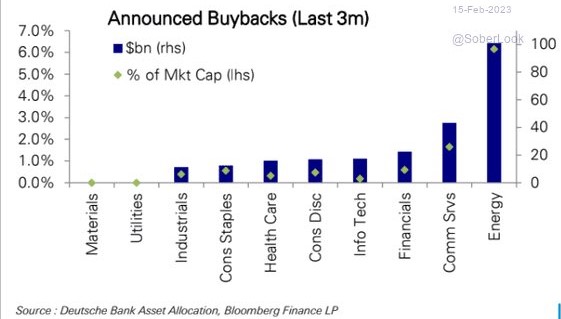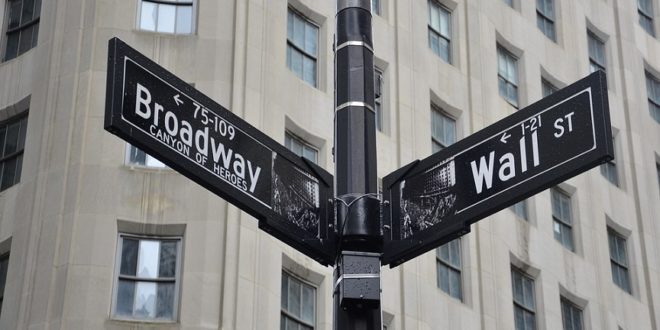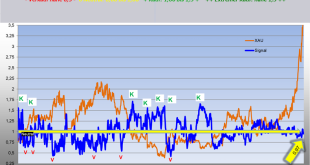Share buybacks are at a record level in the US and are also becoming increasingly popular in Germany. Companies are buying back their own shares like crazy. But does this protect against price losses in a bear market?
Share buybacks in the S&P 500 at record levels
Currently, the S&P 500 actually contains slightly more than 500 stocks. But it’s not because of the higher number of companies that share buybacks are at record levels. They have been rising for years. From October 2021 to the end of September 2022 alone, $982 billion worth of treasury shares were repurchased, according to calculations by analysts at S&P Dow Jones. In the same period last year, the amount was $881 billion. At the top of the list is Apple, which alone invested $88 billion in buybacks. Google’s parent company Alphabet follows directly behind with $60 billion. Share buybacks are also becoming increasingly popular in Germany. Linde, for example, which will leave the DAX for US, is in first place with 10 billion euros. It is followed by Siemens and BASF with 3 billion euros each. Mercedes, which recently announced a buyback program of 4 billion euros despite a weak outlook, will be in between. Their program is set to start in March.

Sense and nonsense of share buyback programs
The logic behind buybacks is as simple as it is compelling. The companies reduce the supply of shares and the profits and dividends are then distributed among fewer shares. Logically, earnings or dividends per share then increase. Analysis shows that over the past decade, about a quarter of share price gains in the U.S. and Europe can be attributed to corporate buyback programs.
Signs of a lack of ideas
But it is naïve to believe that share buyback programs will protect against a correction in this market environment. In the medium and long term, shares rise because companies’ profits increase on a sustained basis. If this is achieved through balance sheet cosmetics such as buybacks, this has at most a short-term effect in a bear market. But it is also clear that anyone buying back shares has no ideas and no imagination. After all, companies could invest the money in their own business. The best example here is Apple. Since the success of the iPhone, the Cupertino-based company has not managed a comparable blockbuster success. Even today, we are still waiting for the iCar and many other things. The situation is similar for other giants out of the Silicon Valley. This is one of the reasons why they put their lavish profits into their own shares. However, some corporations park their huge cash reserves abroad – for tax-saving reasons. In order to be able to run rampant share buyback programs, they then take out a loan. That, too, is a malus.
No protection against bear markets
The fact is, not everyone likes repurchases. In the US, taxes of one percent have had to be paid on them since January 1. President Joe Biden has now proposed quadrupling this tax. The goal, he said, is to ensure that this money flows into the economy and not to shareholders. But such a decision could also have another effect: Dividend payments would become more attractive.
Follow us on Twitter!
By the way, buyback programs do not protect against losses in a bear market. Once the market corrects, those who buy back their own shares in large numbers will also be affected. After all, 2022 was not only the record year for this form of share price maintenance, but also a miserable year for the stock market. For sustainable protection in a difficult market environment, share buyback programs need to be much more extensive. For example, in the past three months, the companies of the S&P 500 announced buybacks worth 7% of their market value (see chart above).
And that times are getting tougher for companies is shown by BASF, already mentioned above. The world’s largest chemical company gave a weak outlook for 2023 last Friday and is bracing for headwinds in the markets. 2,600 jobs will be cut, most of them at its headquarter in Ludwigshafen. That leaves no money for buyback programs. It was discontinued with immediate effect.
Chevron is doing it right
In this environment, Chevron looks quite smart and honest compared to other companies. They had a record year operationally, benefiting from high oil prices and low capital expenditures. That’s why management decided to buy back shares worth $75 billion. In addition, there is a lavish dividend. The 75 billion US dollars correspond to almost a quarter of the total stock market value of around 310 billion US dollars. Buying back shares to such an extent is likely to have the desired effect – perhaps even in a bear market.
Note: Investments in the capital markets are associated with a high level of risk. Investors can lose all of their capital – and more. Remember to do your own due diligence! The content of this website is intended exclusively for readers who are permanent residents of Germany. The German disclaimer applies (see below).
You might also be interested in…
- Obsidian Energy: The big One among the smaller Oil-Producers
- Top 10: The largest Copper-Mines in the World!
- Fund manager Felix Gode: Catch-up potential in German small caps
- Top 10: Best selling Gaming consoles in the World!
- Net Digital: A German payment service provider with AI!
- Share buybacks at recird levels: Will this help in a bear market?
Bilder/Graphiken: Investor-Magazin.de, Pixabay, Deutsche Bank
_____________________________________________________________________________________
DISCLAIMER. BITTE UNBEDINGT BEACHTEN!
Grundsätzlicher Hinweis auf mögliche Interessenskonflikte gemäß Paragraph 34 WpHG i.V.m. FinAnV: Mitarbeiter, Berater und freie Redakteure von www.investor-magazin.de können jederzeit Aktien an allen vorgestellten Unternehmen halten, kaufen oder verkaufen. Das gilt ebenso für abgeleitete Finanzinstrumente. Zudem wird der Betreiber regelmäßig damit beauftragt, Werbetexte für Unternehmen zu erstellen, für die er eine Vergütung erhält. Daher ist eine unabhängige Berichterstattung in diesen Fällen nicht möglich. Wenn der Betreiber eine Vergütung erhält, ist dieser Artikel entsprechend gekennzeichnet. Sollte der Autor eines der vorgestellten Wertpapiere besitzen, wird dies an dieser Stelle genannt. Zudem weisen wir gerne auf die Broschüren der BaFin zum Schutz vor unseriösen Angeboten hin:
– Geldanlage – Wie Sie unseriöse Anbieter erkennen (pdf/113 KB)
– Wertpapiergeschäfte – Was Sie als Anleger beachten sollten (pdf/326 KB)
Risikohinweis: Wir weisen darauf hin, dass der Erwerb von Wertpapieren jeglicher Art hohe Risiken birgt, die zum Totalverlust des eingesetzten Kapitals führen können – oder darüber hinaus. Jegliche auf dieser Webseite verbreiteten Artikel rufen explizit nicht zum Kauf oder Verkauf von Wertpapieren auf. Es kommt weder eine Anlageberatung noch ein Anlagevermittlungsvertrag mit dem Leser zustande. Die hier dargestellten Informationen beziehen sich auf das Unternehmen und nicht auf die persönliche Situation des Lesers. Grundsätzlich möchten wir Ihnen Ideen für unseres Erachtens aussichtsreiche Investments geben. Bitte passen Sie diese dann an Ihre individuelle Strategie und persönliche Finanzsituation an. Und bitte vergessen Sie nicht: Wir haben keine Glaskugel, wir haben aber viel Erfahrung und Wissen. Daher raten wir stets dazu, dass Sie als Leser ihre eigenen Analysen vornehmen. Do your own Due Dilligence!
Datenschutz: Wir geben Ihre Daten nicht an externe Dritte weiter. Aufgrund der neuen Datenschutz Grundverordnung haben wir unsere Datenschutzerklärung aktualisiert. Sie können sich für unseren kostenlosen Newsletter hier anmelden. Eine Abmeldung ist jederzeit per Mail an info (at) investor-magazin.de möglich.
Keine Haftung für Links: Mit Urteil vom 12.Mai 1998 hat das Landgericht Hamburg entschieden, dass man durch die Ausbringung eines Links die Inhalte der verlinkten Seiten ggf. mit zu verantworten hat. Dies kann nur dadurch verhindert werden, dass man sich ausdrücklich von diesem Inhalt distanziert. Für alle Links auf dieser Webseite gilt: Der Betreiber distanziert sich hiermit ausdrücklich von allen Inhalten aller verlinkten Seiten und macht sich diese Inhalte nicht zu Eigen.
Keine Finanzanalyse: Der Herausgeber weist ausdrücklich darauf hin, dass es sich bei den Besprechungen um keine Finanzanalysen nach deutschem Kapitalmarktrecht handelt, sondern um journalistische und/oder werbliche Texte. Sie erfüllen deshalb nicht die Anforderungen zur Gewährleistung der Objektivität von Anlageempfehlungen. Bitte beachten Sie außerdem: Die Nutzung dieses Informationsangebots ist ausschließlich natürlichen Personen vorbehalten, die ihren dauerhaften Wohnsitz in der Bundesrepublik Deutschland haben. Allen anderen natürlichen oder juristischen Personen oder Personengruppen ist die Nutzung wie auch der Zugang zu dieser Webseite nicht gestattet.
Urheberrecht: Der Inhalt und die Struktur dieser Webseite sind urheberrechtlich geschützt und Eigentum des Betreibers. Sie dürfen nicht ohne vorherige schriftliche Zustimmung weder verwendet noch reproduziert werden, auch nicht auszugsweise. Der Betreiber ist bestrebt, in allen seinen Publikationen die Urheberrechte der verwendeten Grafiken, Bilder und Texte zu beachten. Allein aufgrund der bloßen Nennung oder Nichtnennung von Rechten Dritter ist nicht der Schluss zu ziehen, dass diese nicht geschützt sind! Sollte der Betreiber dennoch gegen Rechte Dritter verstoßen haben, wird er unter dem Vorbehalt der Prüfung unverzüglich jegliche Dateien entfernen, sofern er auf die Rechtsverletzung schriftlich hingewiesen wurde.
 Das Investor Magazin Deutsche Aktien, Rohstoffaktien & mehr
Das Investor Magazin Deutsche Aktien, Rohstoffaktien & mehr 




